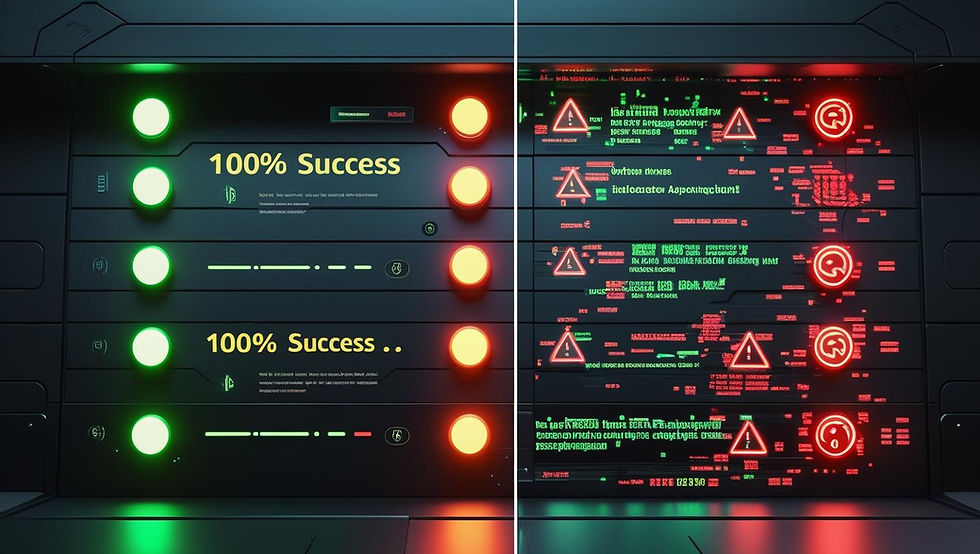Beyond the Black Box: Why Your ERP Programme Needs More Than Just Your System Integrator
- Konexxia Solutions

- Aug 22, 2025
- 4 min read
When embarking on an Enterprise Resource Planning (ERP) implementation, the natural inclination for many organisations is to streamline vendor relationships by entrusting their chosen System Integrator (SI) with every aspect of the project. After all, it seems logical - one throat to choke, simplified contracts, and unified accountability. However, this approach often creates what industry veterans call the "black box" problem, where critical project visibility is lost and specialised expertise is diluted across multiple domains.
The Allure and Danger of the One-Stop Shop
Large system integrators excel at selling the complete package. Their sales teams present compelling narratives about end-to-end responsibility, integrated project management, and seamless delivery. For procurement departments and executive stakeholders, this appears to reduce complexity and risk. The reality, however, is often quite different.
When an SI controls every aspect of an ERP programme, several concerning dynamics emerge:
Limited Transparency: With all workstreams under one umbrella, clients often find themselves receiving high-level status updates that lack the granular detail needed to identify emerging issues. The SI becomes both the source of problems and the reporter of progress, creating an inherent conflict of interest.
Diluted Expertise: While major SIs employ talented individuals, they rarely maintain deep specialists in every domain. A consultant who splits time between functional configuration, data migration, and integration work is unlikely to match the expertise of someone who dedicates their career to a single speciality.
Risk Concentration: When problems arise, and they inevitably do in complex ERP implementations. Having all expertise housed within a single organisation means there's no independent perspective to challenge assumptions or propose alternative approaches.
The Case for Strategic Disaggregation
Smart organisations are increasingly recognising the value of engaging independent specialists for critical periphery functions while maintaining their primary SI relationship for core system implementation. This approach offers several compelling advantages:
Enhanced Transparency and Accountability
Independent contractors and specialised consultancies bring fresh eyes to your project. They're not invested in protecting the SI's reputation or methodology, which means they're more likely to identify and escalate issues early. This creates a natural system of checks and balances that can prevent small problems from becoming project-threatening crises.
Deeper Specialised Expertise
A boutique data migration consultancy that has completed hundreds of similar projects brings a level of expertise that generalist SI resources simply cannot match. They've encountered the edge cases, developed specialised tooling, and refined methodologies through focused repetition. This depth of experience often translates to faster delivery, higher quality outcomes, and innovative solutions to complex challenges.
Competitive Pressure and Innovation
When your SI knows they're being evaluated against independent specialists in specific domains, it naturally elevates their performance. This competitive dynamic often leads to better overall project outcomes as each party strives to demonstrate their value.
Key Functions to Consider for Independent Delivery
Data Migration
Data migration is often the most underestimated aspect of ERP implementations, yet it's frequently the source of the most significant project delays and quality issues. Independent data migration specialists typically offer:
Proprietary tools and accelerators developed specifically for data transformation
Deep experience with legacy system data extraction challenges
Specialised validation and reconciliation methodologies
Focus on data quality that extends beyond basic technical loading
Testing and Quality Assurance
Independent testing organisations bring objectivity that's impossible when the same entity responsible for building the system is also responsible for validating it. They offer:
Unbiased assessment of system readiness
Specialised testing methodologies and tools
Experience across multiple SI delivery approaches
Fresh perspective on business process validation
Systems Integration
While your SI may excel at configuring the ERP system, specialised integration partners often bring superior expertise in:
Modern integration patterns and technologies
Cross-platform connectivity solutions
Performance optimisation for complex data flows
Future-proofing integration architectures
Programme Management
Independent programme managers can provide invaluable oversight by:
Offering objective project health assessments
Bringing experience from diverse implementation approaches
Providing a client advocate perspective
Facilitating difficult conversations between stakeholders and the SI
Navigating the Relationship Dynamics
Successfully implementing a mixed-vendor approach requires careful relationship management. The key is establishing clear boundaries and communication protocols from the outset:
Define Clear Scope Boundaries: Ensure each party understands their responsibilities and the interfaces between their work and others. Ambiguity breeds conflict and finger-pointing.
Establish Collaborative Communication: While healthy competition is beneficial, the various parties must ultimately work together. Regular cross-vendor coordination meetings and shared project management tools are essential.
Maintain Executive Oversight: Senior leadership must actively manage the multi-vendor dynamic, ensuring that competitive tensions remain constructive rather than destructive.
The Bottom Line
The most successful ERP implementations often result from thoughtful orchestration of specialised expertise rather than monolithic vendor delivery. By engaging independent specialists for critical functions like data migration, testing, and integration, organisations can:
Gain unprecedented visibility into project health and progress
Access deeper expertise in specialised domains
Create natural quality assurance through competitive dynamics
Reduce concentration risk across critical project functions
The goal isn't to complicate vendor relationships for their own sake, but to recognise that different aspects of ERP implementations require different types of expertise. Your SI should remain a valued partner for core system implementation, but augmenting their capabilities with specialised independent resources often represents the difference between a successful transformation and a costly disappointment.
In an era where ERP implementations have become more complex and business-critical than ever, can you really afford to put all your eggs in one basket? The most innovative organisations are discovering that the answer is increasingly "no."



